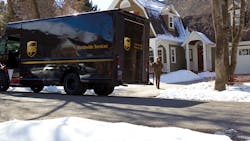Transforming data into intelligence can give fleets the edge
There's a difference between data reporting and data intelligence. Philip Aiello, VP of fleet management and engineering at UPS, said intelligence begins with attributing value to fleet data.
"Everybody tracks GPS," he noted during a panel at the Geotab Connect 2023 conference in Orlando on Feb. 7. "When you take the GPS coordinates and you do other things with it, then it becomes intelligence."
For UPS, the second largest fleet in the U.S. (according to the new FleetOwner 500: For-Hire rankings), intelligence is the next step in the fleet data evolution, according to Aiello. The LTL fleet is moving from conditioned-based maintenance to prognostic maintenance. "It's looking at data points, crawling those data points, looking at that data stream and really making predictions, making forecasting on that vehicle," he explained.
See also: Take time to test, before investing, in the futureWith more than 130,000 vehicles operating in the U.S., that's a lot of data. The most significant key performance indicator for the parcel delivery company is breakdowns. "If you see a UPS vehicle broken down, it's like a UFO—you typically don't see that in your neighborhood. And we're in every neighborhood," Aiello said. It's very critical that we continue to move that number forward."
He credited data intelligence with keeping the Big Brown fleet running. The fleet gets smarter about its equipment with more data correlation, such as tying together GPS, speed, and temperature data. "I tell my people all the time that somewhere in that data is the answer to what we're looking for," Aiello said. "We just have to be smart enough to correlate it."
Part of that correlation process, Aiello added, is knowing what data is just noise and isn't part of the solution. "It's a lot of data to ingest," he explained. "For us, data intelligence is more than just reporting. It's more than just, 'Hey, I got a GPS position.' It's how you use that GPS position to get your revenue and mitigate costs. Or maybe take it to a new concept. We're always looking for the next step. And we're always looking for how do you take that data point and get new learnings from it."
Aiello said that UPS relies on Geotab for deep dives into its fleet data: "Having a partner like Geotab that is very critical with data is very important to us because we don't track things in seconds. We track things in milliseconds. A millisecond to us is a huge impact."
Getting 'the truth' out of fleet data
Drilling down fleet data to milliseconds made a big difference for PepsiCo (No. 2 on the 2022 FleetOwner 500: Private).
"All of a sudden, the truth came out because you see that you see the dips and you see the spikes," explained Bob Zimmer, supply chain fleet technology senior manager at PepsiCo. "But if you're at the one-second level, you're going to miss that one dip that goes down to 7.5 volts. Then over time, you're going to get more and more of those 7.5 volts dips. So it's going to compress."
See also: FleetOwner 500: Top for-hire fleets of 2023But with more granular data, PepsiCo is able to make it smarter by having a better idea of when that equipment will fail by comparing it to past data. "Now we know why it happened, and now we can identify at what point we want to create an insight and flag an electrical PM so that we can get ahead of it."
Zimmer said that PepsiCo, which operates more than 30,000 vehicles in the U.S., "unsiloed" its data. "We allow everyone to access the data—not just from the fleet, but from other areas of the supply chain," he explained.
Working with Geotab, PepsiCo got data from Geotab API documentation that feeds into an "internal data lake" of PepsiCo's North American fleet operations, allowing interested parties to see the data without giving everyone access to the actual Geotab software.
"The unsiloing of that data—it is so important to share it," Zimmer said. "It's so valuable outside of just the fleet organization."
About the Author
Josh Fisher
Editor-in-Chief
Editor-in-Chief Josh Fisher has been with FleetOwner since 2017. He covers everything from modern fleet management to operational efficiency, artificial intelligence, autonomous trucking, alternative fuels and powertrains, regulations, and emerging transportation technology. Based in Maryland, he writes the Lane Shift Ahead column about the changing North American transportation landscape.

